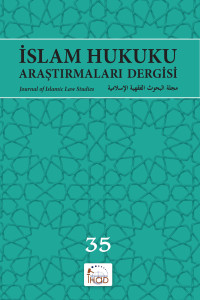İslâm Hukukunda Kamu Otoritesinin Mubahı Sınırlandırmaya Yönelik Tasarruflarının İctihad Teorisindeki Yeri
Abstract
Mubah, tikel açıdan mükellefin yapma ve terk etme arasında muhayyer bırakıldığı hukukî serbest alanları ifade etmektedir. Tümel açıdan ise mubah, dinen korunması zorunlu olan beş temel esastan (zarûrât-i hamse) biriyle ilgili olması, zarar içermesi, başkalarının hakkını ve kamu yararını ilgilendirmesi, dinen yapılması veya terk edilmesi istenilen bir fiile vesile olması gibi durumlarda farklı hükümler de alabilmektedir. Dolayısıyla tümel açıdan bakıldığında, kamu otoritesinin -emretme veya yasaklama ya da kullanılmasını bazı kayıtlara bağlama şeklinde- mubahı sınırlandırması söz konusu olabilmektedir. İslâm hukuk metodolojisinde ictihad, genel olarak lafza ve manaya dayalı olmak üzere ikiye ayrılmaktadır. Lafza dayalı ictihad yönteminde, dil unsuru esas alınmakta ve hüküm doğrudan nassın lafzından çıkarılmaktadır. Manaya dayalı ictihad yönteminde ise nastaki hükmün illeti (kıyas ictihadı) veya Şâri’in genel maksadı (makâsıd ictihadı/maslahat ictihadı) esas alınarak yeni bir meselenin şer’î/dinî hükmü tespit edilmektedir. Klasik İslâm hukuku doktrininde cumhura göre devlet başkanında bulunması gereken şartlardan biri de prensip olarak ictihad ehliyetine sahip olmasıdır. Diğer taraftan, “Raiyye yani tebe’a (toplum) üzerine tasarruf maslahata menuttur” (Mecelle, md. 58) kaidesi gereğince İslâm hukukunda yöneticilerin tasarruflarının kamu yararına (maslahata) uygun olması gerekmektedir. Bu şartlar dikkate alındığından kamu otoritesinin mubah (hukuki serbest) alanı sınırlandırmaya yönelik tasarrufları “siyasî” olduğu kadar aynı zamanda “ictihadî” bir faaliyet olmaktadır. Buna göre kamu otoritenin (devletin/devlet başkanının) mubahın sınırlandırılmasına yönelik tasarruflarının, ictihad teorisinde maslahata dayalı olarak yapılan ictihad türü (makâsıd ictihadı/maslahat ictihadı) ile yakın ilişkisi bulunmaktadır. Bu açıdan bakıldığında sivil otoritenin (ulema/müctehid) maslahata dayalı ictihad faliyeti ile siyasi otoritenin (umera/devlet başkanı) maslahata dayalı ictihadî tasarrrufu arasında meşruiyet ve geçerlilik açısından bir fark bulunmamaktadır.
The Place of the Applications of the Public Authority (President) on the Restriction of the Legal Free Area (Mubah) in Ijtihad Theory in the Islamic Law
Abstract
Mubah expresses the legally free areas in which human beings are left to make a difference between making and leaving. In general terms, mubah can take different provisions in cases such as being related to one of the five basic principles (zarûrât-i hamse) that are obligatory to be protected religiously, containing harm, involving the right and public interest of others, conducting a religious act or leaving a deed. Therefore, from a general point of view, public authority may restrict the prosperity - in the form of ordering or prohibition or the use of it under certain conditions. In Islamic law methodology (usûlü’l-fiqh), ijtihad is generally divided into two parts based on word and meaning. In the word-based method of ijtihad, the language element is taken as the basis and the verdict is directly derived from the wording of the nass. In the meaningful method of ijtihad, the religious decree of a new issue is determined based on the justification of the judgment in the text (verse or hadith) or the general purpose of Shari (Legislator). According to the classic Islamic law doctrine, one of the conditions that should be present in the head of state is the fact that it possesses a license to ictihad. On the other hand, In accordance with the rule of law, “The practices of the head of state on society must be based on the common good” (Mecelle, art. 58), the practices of the administrators in Islamic law must be in accordance with the public good. As this conditions are taken into account, the public authority’s practices for limiting the legal free area (mubah) are political as well as an activity of ijtihad. According to this, it is possible to say that the political authority’s practices towards limiting the mubah have a close relationship with the type of ijtihad which is based on the conscience in the theory of ijtihad. From this point of view, there is no difference between the ijtihad of the civil authority (ulema/islamic jurists) based on the public good (maslahat) and the ijtihad of the political authority (umera/head of state) based on the public good (maslahat) in terms of legitimacy and validity.
Details
| Primary Language | Turkish |
|---|---|
| Subjects | Religion, Society and Culture Studies |
| Journal Section | Research Articles |
| Authors | |
| Publication Date | April 30, 2020 |
| Submission Date | November 1, 2019 |
| Published in Issue | Year 2020 Issue: 35 |



